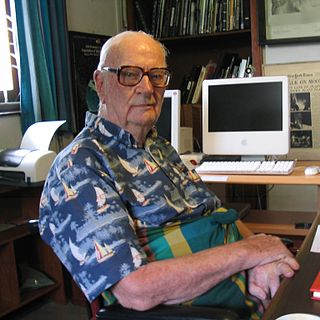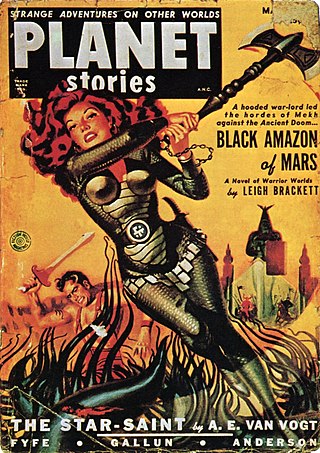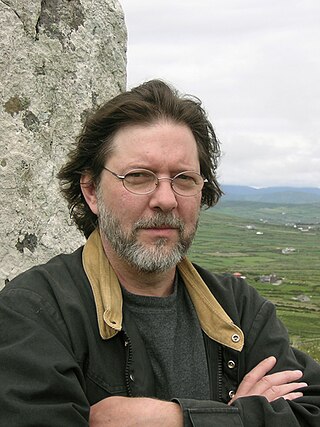
Hard science fiction is a category of science fiction characterized by concern for scientific accuracy and logic. The term was first used in print in 1957 by P. Schuyler Miller in a review of John W. Campbell's Islands of Space in the November issue of Astounding Science Fiction. The complementary term soft science fiction, formed by analogy to hard science fiction, first appeared in the late 1970s. The term is formed by analogy to the popular distinction between the "hard" (natural) and "soft" (social) sciences, although there are examples generally considered as "hard" science fiction such as Isaac Asimov's Foundation series, built on mathematical sociology. Science fiction critic Gary Westfahl argues that neither term is part of a rigorous taxonomy; instead they are approximate ways of characterizing stories that reviewers and commentators have found useful.

Mars, the fourth planet from the Sun, has appeared as a setting in works of fiction since at least the mid-1600s. Trends in the planet's portrayal have largely been influenced by advances in planetary science. It became the most popular celestial object in fiction in the late 1800s, when it became clear that there was no life on the Moon. The predominant genre depicting Mars at the time was utopian fiction. Around the same time, the mistaken belief that there are canals on Mars emerged and made its way into fiction, popularized by Percival Lowell's speculations of an ancient civilization having constructed them. The War of the Worlds, H. G. Wells's novel about an alien invasion of Earth by sinister Martians, was published in 1897 and went on to have a major influence on the science fiction genre.

Glen David Brin is an American science fiction author. He has won the Hugo, Locus, Campbell and Nebula Awards. His novel The Postman was adapted into a 1997 feature film starring Kevin Costner.

Alien invasion or space invasion is a common feature in science fiction stories and film, in which extraterrestrial lifeforms invade the Earth to exterminate and supplant human life, enslave it, harvest people for food, steal the planet's resources, or destroy the planet altogether. It can be considered as a science-fiction subgenre of the invasion literature, expanded by H. G. Wells's seminal alien invasion novel The War of the Worlds.
The Uplift Universe is a fictional universe created by American science fiction writer David Brin. A central feature in this universe is the process of biological uplift.

Michael Whelan is an American artist of imaginative realism. For more than 30 years, he worked as an illustrator, specializing in science fiction and fantasy cover art. Since the mid-1990s, he has pursued a fine art career, selling non-commissioned paintings through galleries in the United States and through his website.

Planet Stories was an American pulp science fiction magazine, published by Fiction House between 1939 and 1955. It featured interplanetary adventures, both in space and on some other planets, and was initially focused on a young readership. Malcolm Reiss was editor or editor-in-chief for all of its 71 issues. Planet Stories was launched at the same time as Planet Comics, the success of which probably helped to fund the early issues of Planet Stories. Planet Stories did not pay well enough to regularly attract the leading science fiction writers of the day, but occasionally obtained work from well-known authors, including Isaac Asimov and Clifford D. Simak. In 1952 Planet Stories published Philip K. Dick's first sale, and printed four more of his stories over the next three years.

Bruce Farrington Coville is an author of young adult fiction. Coville was first published in 1977 and has written over 100 books.

Jon Scieszka is an American children's writer, best known for his picture books created with the illustrator Lane Smith. He is also a nationally recognized reading advocate, and the founder of Guys Read – a web-based literacy program for boys whose mission is "to help boys become self-motivated, lifelong readers."
The exploration of politics in science fiction is arguably older than the identification of the genre. One of the earliest works of modern science fiction, H. G. Wells’ The Time Machine, is an extrapolation of the class structure of the United Kingdom of his time, an extreme form of social Darwinism; during tens of thousands of years, human beings have evolved into two different species based on their social class.

John Jude Palencar is an American illustrator and fine artist, who specializes in works of fantasy, science fiction, and horror. In 2010, he was given the Hamilton King Award. His highly detailed work is described as containing a rich language of symbols and archetypes, which are left open to interpretation by the viewer.

Robert Paul Holdstock was an English novelist and author best known for his works of Celtic, Nordic, Gothic and Pictish fantasy literature, predominantly in the fantasy subgenre of mythic fiction.
A flag of Mars is a concept of a possible flag design, meant to symbolize the planet Mars or to represent a fictional Martian government, in works of fiction.
Seymour Simon is an American writer of children's books; he is primarily a science writer.
Guys Read is a web-based literacy program for boys founded by author Jon Scieszka in 2001. Its mission is "to help boys become self-motivated, lifelong readers" by bringing attention to the issue, promoting the expansion of what is called "reading" to include materials like comic books, and encouraging grown men to be literacy role models.
Thomas P. Kratman is an American military science fiction author and retired United States Army officer whose work is published by Baen Books. Kratman's novels include the Desert Called Peace series which has been praised for its action sequences and attention to philosophy of war. He authored three novels with John Ringo in the Legacy of the Aldenata series. Kratman's works often reflect right-wing political perspectives and some have been seen as deliberately crafted to offend left-wing sensibilities. During the Sad Puppies campaign in 2015, Kratman was nominated for a Hugo Award for his novella Big Boys Don't Cry.

Mac Barnett is an American writer of children's books living in Oakland, California. He was born in Castro Valley, California but grew up in Castro Valley and Oakland.

Multiverse: Exploring Poul Anderson's Worlds is a gedenkschrift honoring science fiction and fantasy author Poul Anderson, in the form of an anthology of short stories and tributes edited by Greg Bear and Gardner Dozois. The book also includes cover art and interior illustrations by Bob Eggleton. It was first published in hardcover in May 2014 by Subterranean Press, with simultaneous paperback and ebook editions issued in June 2015 by Baen Books. All but one of the pieces are original to the anthology; the remaining one, Tad Williams's "Three Lilies and Three Leopards ", was originally published in the Winter 2012 issue of the ejournal Subterreanean Online.

This is a complete list of works by American author Robin Hobb, the pen name of Margaret Astrid Lindholm Ogden, who also writes under the pen names Megan Lindholm.
Legends and speculative fiction reveal a longstanding human fascination with rolling and wheeled creatures. Such creatures appear in mythologies from Europe, Japan, pre-Columbian Mexico, the United States, and Australia, and in numerous modern works.











